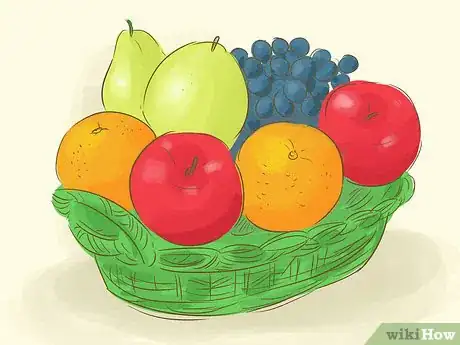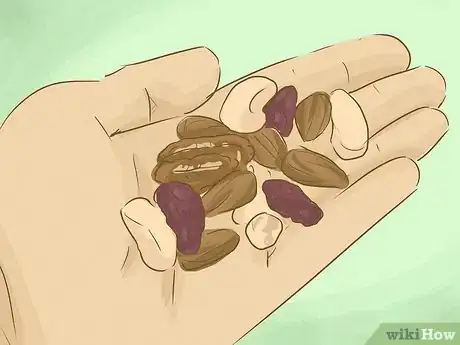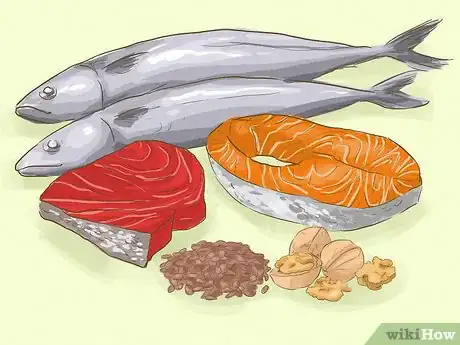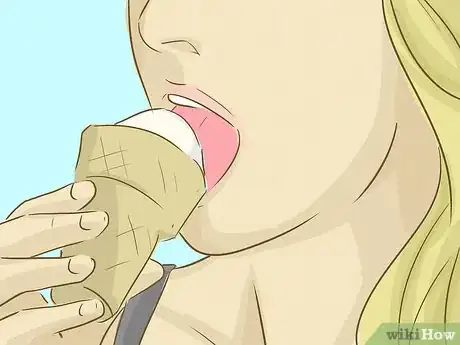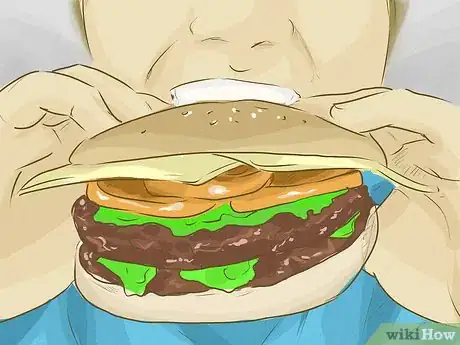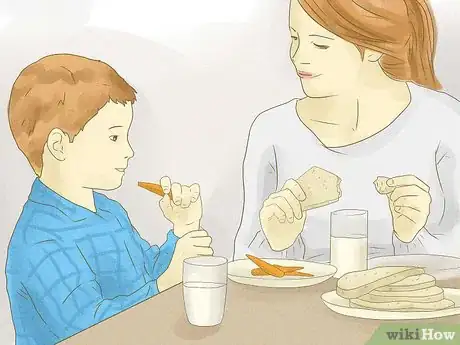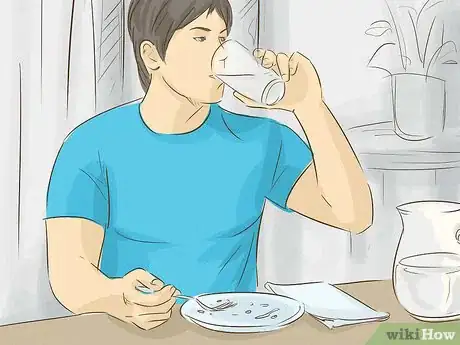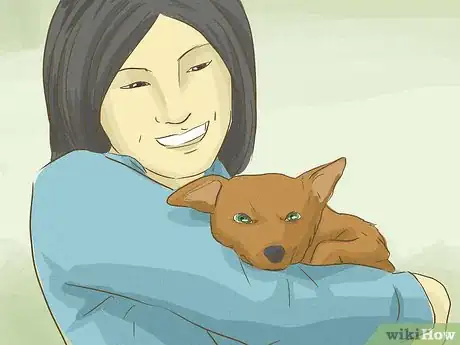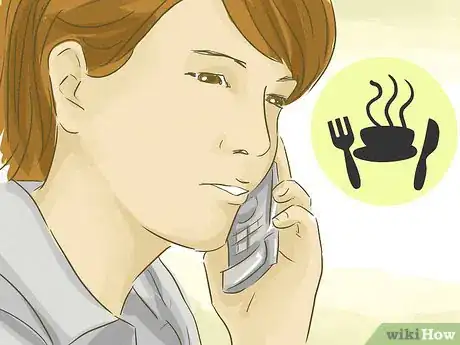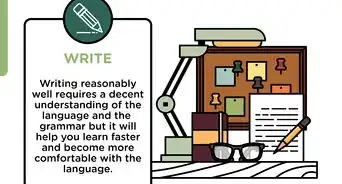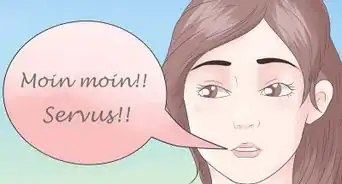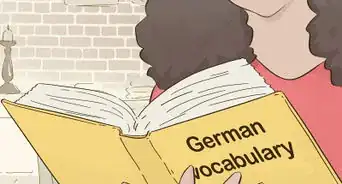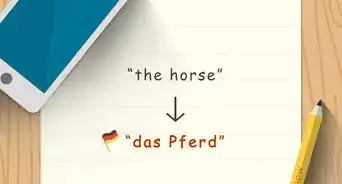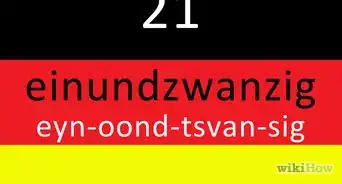X
wikiHow is a “wiki,” similar to Wikipedia, which means that many of our articles are co-written by multiple authors. To create this article, volunteer authors worked to edit and improve it over time.
There are 7 references cited in this article, which can be found at the bottom of the page.
This article has been viewed 28,769 times.
Learn more...
Whether you're in a German restaurant, having a fancy dinner with German relatives, or simply want to learn how to talk about simple fruits and vegetables, this article can help.
Steps
Part 1
Part 1 of 3:
Talking About Common Foods
-
1Know how to say common vegetables. Vegetables (or Gemüse, in German) are a staple in many German dishes. A few common vegetables in Germany as well as the US are these eight:
- Potato/Potatoes = die Kartoffel (car-tof-ul), Kartoffeln (car-tof-eln)
- Lettuce = der Kophsalat (copf-salad)
- Tomato = die Tomate (toe-maa-te)
- Cauliflower = der Blumenkohl (blue-min-cole)
- Brocolli = der Brokkoli (bra-col-lee)
- Carrot, Carrots = die Karotte (car-rot-uh), die Möhre (mir-ruh)
- Cucumber(s) = Gurke (gore-kuh)
- Onion(s) = die Zwiebel(n) (swe-bul)
-
2Understand fruits. One of the most eaten fruits in Germany are Bananas, with the average German eating about 23 pounds of Bananas each year! Here are the most common fruits:
- Apple = der Apfel (ap-full)
- Strawberries = die Erdbeeren (eert-bee-ren)
- Banana = die Banane (ba-nana)
- Grapes = die Trauben (chr-ow-bin
- Cherries = die Kirschen (cursh-in)
- Orange = die Orange (o-ran-juh)
- Pear = die Birne (bur-nehr)
- Berries = die Beeren (beer-in)
- Fruit = Früchte/Obst (fruuch-tuh)
- Peach = der Pfirsich (fur-sich)
Advertisement -
3Understand different grains, seeds, and nuts.
- Bread = das Brot (broot)
- White bread = das Weißbrot (wais-broot)
- Wheat bread = das Weizenbrot (wai-tsen-broot)
- Seeds = die Samen (saa-men)
- Nuts = die Nüsse (new-se)
- Rice = der Reis (rais)
- Raisins = die Rosinen (roo-see-nen)
- Oats = der Hafer (haa-fer)
-
4Learn how to say common types of meats and proteins.
- Meat/Beef = das Fleisch (fly-sh)
- Fish = der Fisch (fish)
- Egg = das Ei (I)
- Sausage = die Wurst (vourst)
- Pork = der Speck (sch-pek)
- Chicken = das Hähnchen (heen-chen)
- Seafood = Meeresfrüchte (meer-es-froosh-tuh)
- Poultry = Geflügel (ge-fluh-gel)
-
5Know dairy items and products made from milk. Germany is the EU's largest milk producer. Dairy cows are kept on nearly one out of every four agricultural farms in Germany! Here is how to say dairy products in German:
- Milk = Milch (milsh)
- Butter = Butter (but-tar)
- Cheese = Käse (kay-suh)
- Yougurt = Joghurt (yo-gurt)
- Cream = Sahne (zah-ne)
- Ice cream = Eiscreme (eyes-cream)
- Whey = Molke (mull-kuh)
- Casein = Kasein (ka-see-iin)
- Dairy = Molkerei (mol-kur-i)
-
6Know lentils and beans. Lentils and beans are often used in soup dishes in Germany. Here is how to pronounce and spell German plant-based proteins:
- Lentils = die Linsen (lin-sen)
- Quinoa = der Quinoa (kii-noo-ah)
- Chickpeas = die Kichererbsen (ki-cher-erp-sen)
- Peanuts = die Erdnüsse (erd-noo-se)
- Almonds = die Mandeln (man-deln)
- Tofu = der Tofu (too-fu)
- Beans = die Bohnen (bow-neh)
-
7Learn about street foods. Food pyramids do not include common street foods and fast foods. Here's how to say convenience foods in German:
- French fries = Pommes frites (pommes-frits)
- Burger = Burger (bur-gur)
- Fried chicken = Brathähnchen (braat-han-chen)
- Pizza = Pizza (peet-zuh)
- Sandwich = Sandwich (saand-wich)
- Salad = Salat (salaat)
Advertisement
Part 2
Part 2 of 3:
Using Phrases to Discuss Hunger
-
1Understand different ways to say you're hungry:
- I would like to eat. = Ich würde gerne essen (ish-vurda-garenuh-essen).
- I am hungry = Ich habe Hunger (ish-haba-hunga).
- I am starving = Ich verhungere (ish-vahungera)
-
2Know different ways to say you aren't hungry. There are a few ways to say you aren't hungry or don't want to eat, here they are:
- I am not hungry. = Ich bin nicht hungrig (ish-bin-nisht-hungrich).
- I do not have an appetite. = Ich habe keinen Appetit (ish-haba-kaine-apeeteet).
- I do not want to eat = Ich will nicht esen (ish-vil-nisht-essen)
- I am full. = Ich bin voll (ish-bin-foal).
-
3Learn idioms and hyperboles to talk about hunger:
- I am famished = Ich bin am Verhungern (ish-bin-om-vahungera).
- I am so hungry I could eat a horse = Ich bin so hungrig, ich könnte ein Pferd essen (ish-bin-so-hugrish-ich-konte-ein-faird-essen).
- As hungry as a bear. = Wie hungrig wie ein Bär (vie-hungrish-vie-ein-baar).
Advertisement
Part 3
Part 3 of 3:
Complimenting & Complaining About Food
-
1If a meal isn't edible, or simply isn't good, you might give a complaint about the meal. Here's how to:
- The food is too hot. = Das Essen ist zu heiß (das-esen-ist-zu-heiss).
- The food is too cold. = Das Essen ist zu kalt (das-esen-ist-zu-kaalt).
- The food is inedible. = Das Essen ist ungenießbar (das-esen-ist-ungeniisbaar).
- The food is too tough. = Das Essen ist zu hart (das-esen-ist-zu-hart).
- The food does not taste good. = Die essen schmeckt nicht gut (dee-esen-shmekt-nisht-goot).
-
2Hopefully, you'll want to compliment a cook's food:
- The food is tasty! = Das Essen ist lecker (daas-esen-ist-lekur)!
- The food is delicious! = Das Essen ist köstlich (daas-esen-ist-costlish)
- The meal/food tonight was very tasty. = Das Essen heute Abend war sehr lecker (das-esen-hoita-ahbend-var-sehr-lekur).
- You are a fantastic cook. = Sie sind eine fantastische Köchin (see-sind-einuh-fantastishe-kooshin).
Advertisement
Community Q&A
-
QuestionHow do I say 'Polenta' in German?
 NicoTop AnswererThe most common way to say "Polenta" in German is "Polenta" (both in English and German). 'Maisbrei,' (mais-bree) which translates to 'corn grits,' is another way to say polenta.
NicoTop AnswererThe most common way to say "Polenta" in German is "Polenta" (both in English and German). 'Maisbrei,' (mais-bree) which translates to 'corn grits,' is another way to say polenta.
Advertisement
References
- https://www.fluentu.com/blog/german/vegetables-in-geman/
- https://www.germanveryeasy.com/vegetables
- https://www.fluentu.com/blog/german/fruits-in-german/
- https://angelikasgerman.co.uk/how-to-talk-about-food-in-german/
- https://study.com/academy/lesson/german-adjectives-to-describe-food.html
- https://www.bbc.co.uk/bitesize/topics/zk7rgwx/articles/z6xwgwx
- https://pasttenses.com/food-english-german
About This Article
Advertisement

